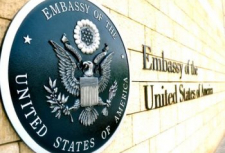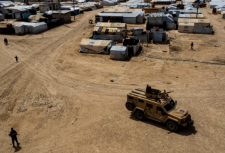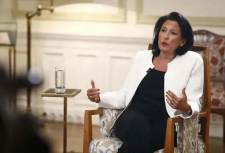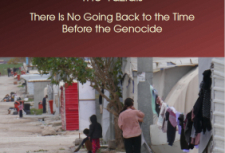Barriers to return for ethno-religious minorities in Iraq
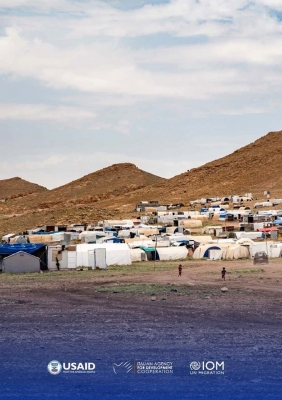
Identity Politics and Political Patronage Among Yazidiand Christian Communities from Ninewa Governorate
by Saad Salloum, January 2020
Although migration is not new to ethno-religious minoritiesfrom Iraq, the current situation has reactivated discussionsamong and between these communities on their future andplace in Iraq, including perspectives on how, and under whichadministration, areas of return should be managed. Thesediscussions show fundamental divisions within ethnoreligious minority communities, further compounded by thepositions of political and religious leaders and identity politics.
This report aims to explore current positions amongethno-religious minorities to analyse how these positions ifluence decision-making on return and migration. Based ona number of qualitative interviews with community leadersin and outside Iraq, focus group discussions with variousethno-religious minorities in displacement contexts, and avariety of secondary data, this report provides an overviewof the main divisions among ethno-religious communities.
The report finds that the way members of ethno-religious minorities identify themselves is what mostly infuences these divisions. Definitions of identity have changed duringdisplacement and are likely to continue shifting as the outcomes of the conflict unfold. This identity shift startedtaking shape with the US led invasion of Iraq in 2003, which resulted in the dominance of three major groups (Kurds,Shiites and Sunnis) over ethno-religious minorities. Years ofviolence and discrimination since 2003 and ISIL’s territorialclaim in 2014 led to the scattering of ethno-religious minorities across Iraq, subsequent protracted displacement and often migration abroad. ISIL’s genocidal attack against the Yazidis in 2014 led community members to reconsider the basic components of their identity and to choose an identity that is less dependent on a geographic location or nedpolitical narrative. While among Yazidis, identity politics are at the core of intercommunity divisions, the main split among Christians is between political and religious stakeholders.Christian communities (Chaldeans, Syriacs, Assyrians and Armenians) are fragmentated because of internal splits between the various Christian denominations and theirmultiple political parties.Furthermore, discussions among ethno-religious commu-nities often reveal a generational divide, with a disconnectbetween the established leadership –who are traditionally older– and younger generations, who are undergoing aprocess of identity change. This disconnect calls into ques-tion the representation of minorities by the current religious and political stakeholders. Internal identity divisions are further deepened by political competition at various levels which will ultimately the fate of the areas of origin of Yazidis and Christians. It is often reported that the main obstacles preventing the return of IDPs from ethno-religious minorities are a lack of infrastructure and services in areas of return, protection concerns and a general sense of instability.
Tags: #yazidisinfo #ezidi #news #ngo #ethnoreligious
Barriers to return for ethno-religious minorities in Iraq

Identity Politics and Political Patronage Among Yazidiand Christian Communities from Ninewa Governorate
by Saad Salloum, January 2020
Although migration is not new to ethno-religious minoritiesfrom Iraq, the current situation has reactivated discussionsamong and between these communities on their future andplace in Iraq, including perspectives on how, and under whichadministration, areas of return should be managed. Thesediscussions show fundamental divisions within ethnoreligious minority communities, further compounded by thepositions of political and religious leaders and identity politics.
This report aims to explore current positions amongethno-religious minorities to analyse how these positions ifluence decision-making on return and migration. Based ona number of qualitative interviews with community leadersin and outside Iraq, focus group discussions with variousethno-religious minorities in displacement contexts, and avariety of secondary data, this report provides an overviewof the main divisions among ethno-religious communities.
The report finds that the way members of ethno-religious minorities identify themselves is what mostly infuences these divisions. Definitions of identity have changed duringdisplacement and are likely to continue shifting as the outcomes of the conflict unfold. This identity shift startedtaking shape with the US led invasion of Iraq in 2003, which resulted in the dominance of three major groups (Kurds,Shiites and Sunnis) over ethno-religious minorities. Years ofviolence and discrimination since 2003 and ISIL’s territorialclaim in 2014 led to the scattering of ethno-religious minorities across Iraq, subsequent protracted displacement and often migration abroad. ISIL’s genocidal attack against the Yazidis in 2014 led community members to reconsider the basic components of their identity and to choose an identity that is less dependent on a geographic location or nedpolitical narrative. While among Yazidis, identity politics are at the core of intercommunity divisions, the main split among Christians is between political and religious stakeholders.Christian communities (Chaldeans, Syriacs, Assyrians and Armenians) are fragmentated because of internal splits between the various Christian denominations and theirmultiple political parties.Furthermore, discussions among ethno-religious commu-nities often reveal a generational divide, with a disconnectbetween the established leadership –who are traditionally older– and younger generations, who are undergoing aprocess of identity change. This disconnect calls into ques-tion the representation of minorities by the current religious and political stakeholders. Internal identity divisions are further deepened by political competition at various levels which will ultimately the fate of the areas of origin of Yazidis and Christians. It is often reported that the main obstacles preventing the return of IDPs from ethno-religious minorities are a lack of infrastructure and services in areas of return, protection concerns and a general sense of instability.
Tags: #yazidisinfo #ezidi #news #ngo #ethnoreligious

